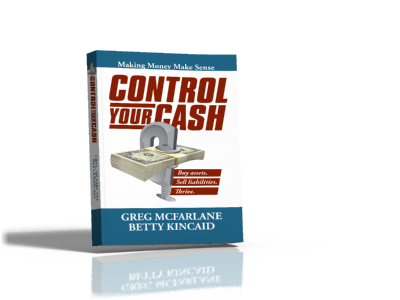Too cheap to spend $12 ($10 on Kindle) for our book? We’ll post a different excerpt here weekly. They won’t be in sequence, so you’ll have to print them out, lay them on your living room floor, rearrange them and then put them together. Yeah, that’s way easier than buying your own copy. Just do it already. Meanwhile, here’s the current excerpt:
_______________________________________________________________________________
Find a bank that’ll give you a free checking account regardless of what your balance is. Many banks will, if your employer will deposit your pay directly. As soon as the money lands in your account, transfer as much of it as you can to an account that bears interest.
I’m getting the hang of this. Put enough money in my checking account to cover any upcoming checks. Obviously I can deposit more in there, to anticipate any future checks. Should I then keep the rest of my money in my savings account?
Not exactly. Not when your bank offers another type of account, the money market (deposit) account. Functionally, it combines the best features of both savings accounts and checking accounts, paying interest while letting you write checks. A money market account differs from a savings account in that the bank takes your deposits, plus those of all the other money market accountholders, and buys investments with them. The investments they buy are (or should be) very conservative — government constructs such as United States Treasury bills, which are the stereotypical safe investment. T-bills currently offer an annual interest rate around .3%. While that fluctuates, it’s almost guaranteed to be higher than what your savings account can pay.
Why not buy the T-bills myself?
Volume discounts. Your bank can buy way more T-bills than you can, thus qualifying for better rates. On top of that, if your bank is desperate to raise cash — maybe to cover some outstanding loans — it’ll offer exceptionally generous money market rates.
The downside to money market accounts is that they’re regulated by the Federal Deposit Insurance Corporation. You’re only allowed to withdraw from your money market account 6 times a month, and only 3 of those withdrawals can be via check. Most banks also require you to keep $2500 in your money market account. Normally the more you have in your account, the higher the interest rate the bank will pay you. Interest is compounded daily and paid monthly.
Shop around for money market rates. A glance at BankRate.com shows rates ranging up to 1.69%, the higher returns offered by banks that need to raise as much cash as they can, as soon as possible. The banks offering lower rates know that most of their customers don’t bother checking the rates. Banks can change their rates monthly — and when market conditions are volatile, often do. Shop around for rates, and think nothing of transferring money out of one bank and into another that’s offering a higher rate.
Does my bank offer anything else?
Certificates of deposit. (That’s the American term. CDs are called time deposits or term deposits in the rest of the world.) CDs pay higher interest rates than any of the accounts we’ve mentioned so far. Unlike a savings account, but like most good things, they don’t last forever. CDs have a term (3 months, 6 months, a year, 5 years) during which you can’t withdraw money from them without paying a big penalty — like 3 months’ interest (or 6 months’ interest for CDs with terms longer than a year.) Like a money market account, a CD requires a minimum deposit and pays a (usually) fixed interest rate.
The more you deposit, and the longer, the higher you can expect the rate to be. You might be surprised to know that small banks generally offer the highest rates. That’s because when small banks need to raise funds, they need to do it more quickly than large banks do. Keep shopping around. One CD might pay twice the interest of one of the same term at a different bank.
Losing 3 or 6 months’ interest for withdrawing early is a hefty penalty. If interest rates have risen enough (or were low enough to start with), it might be worth it to take the hit.
